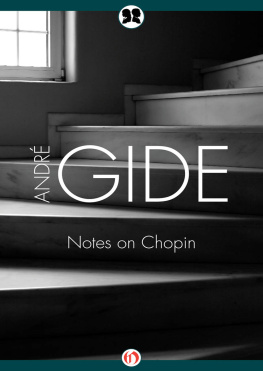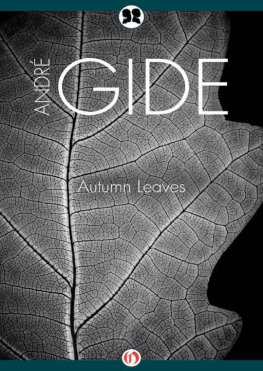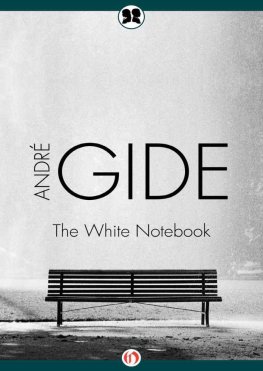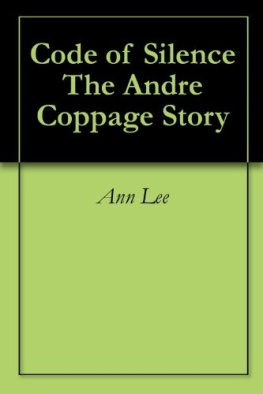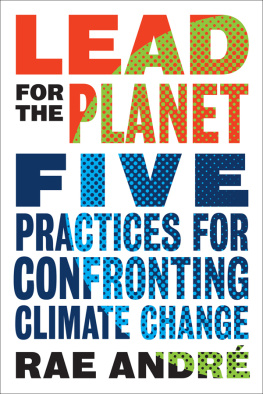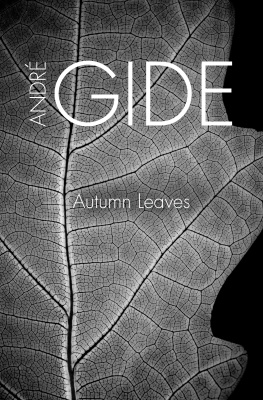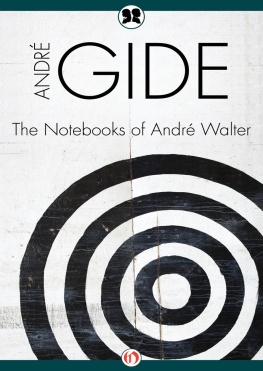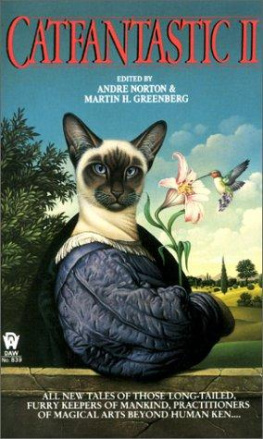Andre Gide - If It Die
Here you can read online Andre Gide - If It Die full text of the book (entire story) in english for free. Download pdf and epub, get meaning, cover and reviews about this ebook. year: 2014, publisher: Knopf Doubleday Publishing Group, genre: Non-fiction. Description of the work, (preface) as well as reviews are available. Best literature library LitArk.com created for fans of good reading and offers a wide selection of genres:
Romance novel
Science fiction
Adventure
Detective
Science
History
Home and family
Prose
Art
Politics
Computer
Non-fiction
Religion
Business
Children
Humor
Choose a favorite category and find really read worthwhile books. Enjoy immersion in the world of imagination, feel the emotions of the characters or learn something new for yourself, make an fascinating discovery.

- Book:If It Die
- Author:
- Publisher:Knopf Doubleday Publishing Group
- Genre:
- Year:2014
- Rating:4 / 5
- Favourites:Add to favourites
- Your mark:
- 80
- 1
- 2
- 3
- 4
- 5
If It Die: summary, description and annotation
We offer to read an annotation, description, summary or preface (depends on what the author of the book "If It Die" wrote himself). If you haven't found the necessary information about the book — write in the comments, we will try to find it.
If It Die — read online for free the complete book (whole text) full work
Below is the text of the book, divided by pages. System saving the place of the last page read, allows you to conveniently read the book "If It Die" online for free, without having to search again every time where you left off. Put a bookmark, and you can go to the page where you finished reading at any time.
Font size:
Interval:
Bookmark:
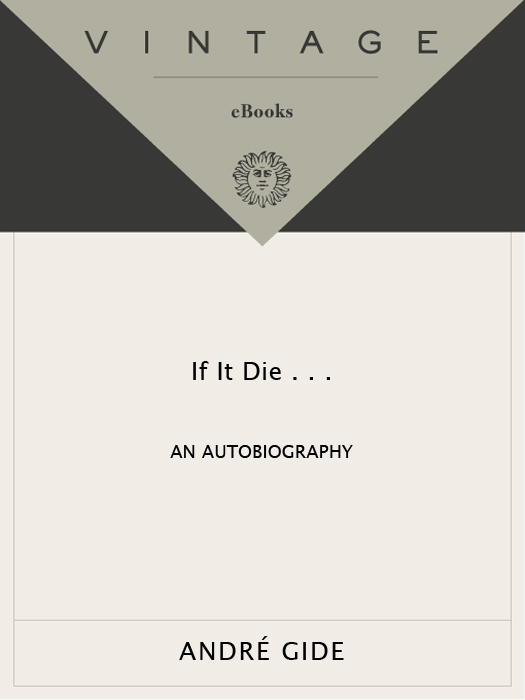
Andr Gide was born in Paris in 1869 and died there in 1951. He was awarded the Nobel Prize for Literature in 1947. His works include The Immoralist, The Counterfeiters, Lafcadios Adventures, Strait Is the Gate, The Cellars of the Vatican, and his three volumes of Journals. He also wrote plays, essays, short stories, and books of travel.

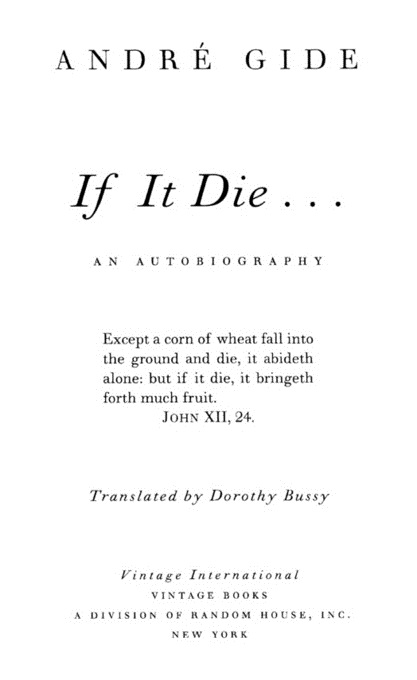

FIRST VINTAGE INTERNATIONAL EDITION, MAY 2001
Copyright1935 by The Modern Library, Inc., New York
Copyright renewed 1963 by Random House, Inc.
All rights reserved under International and Pan-American Copyright Conventions. Published in the United States by Vintage Books, a division of Random House, Inc., New York, and simultaneously in Canada by Random House of Canada Limited, Toronto. Originally published in hardcover in the United States by The Modern Library, a division of Random House, Inc., New York, in 1935.
Vintage is a registered trademark and Vintage International and colophon are trademarks of Random House, Inc.
The Library of Congress has cataloged the Modern Library edition as follows:
Gide, Andr, 18691951.
If it die an autobiography; translated by Dorothy Bussy.
3-331 p. 24 cm.
1. Gide, Andr, 18691951. 2. Authors, French20th centuryBiography.
PQ2613.I2 Z52 1935
Vintage ISBN: 978-0-375-72606-4
eBook ISBN: 978-1-101-91044-3
www.vintagebooks.com
v3.1
I WAS BORN ON NOVEMBER 22ND, 1869. MY parents at that time lived in the Rue de Mdicis in an apartment on the fourth floor which they left a few years later and of which I have kept no recollection. Stay though, I do remember the balcony, or rather what could be seen from the balconythe birds-eye view of the Place with its ornamental piece of water and fountain; or rather, to be still more exact, I remember the paper dragons which my father used to cut out for me and which we launched into the air from the balcony; I remember their floating away in the wind over the fountain in the Place below and being carried away as far as the Luxembourg Gardens, where they used sometimes to catch in the top branches of the horse-chestnut trees.
I remember too a biggish tablethe dining-room table, no doubtwith its table-cloth that reached nearly to the ground; I used to crawl underneath it with the concierges little boy, who sometimes came to play with me.
What are you up to under there? my nurse would call out.
Nothing; were playing. And then we would make a great noise with our playthings, which we had taken with us for the sake of appearances. In reality, we amused ourselves otherwise, beside each other but not with each other; we had what I afterwards learnt are called bad habits.
Which of us two taught them first to the other? I have no idea. Surely a child may sometimes invent them for himself. Personally, I cannot say whether anyone instructed me in the knowledge of pleasure or in what manner I discovered itI only know that as far back as my recollection goes, I cannot remember a time without it.
I perfectly realise, for that matter, that I am doing myself harm by relating this and other things that follow; I foresee what use will be made of them against me. But the whole object of my story is to be truthful. Put the case that I am writing it for a penance.
One would like to believe that in that age of innocence the soul is all sweetness, light and purity, but I can remember nothing in mine that was not ugly, dark and deceitful.
I used to be taken for my outings to the Luxembourg; but I would not play with the other children; I kept sulkily apart with my nurse and watched their games. I remember once they were making mud-pies with their pails All of a sudden, when my nurse was looking another way, I dashed up and trampled all the pies underfoot.
The only explanation I can think of for this behaviour is that I must have gone up to one of the children and asked to be allowed to play with them. It was their refusal that enraged me so and made me want to destroy their game.
The other incident I must relate is still odder, for which reason, no doubt, I am less ashamed of it. I often heard my mother tell the story later on, so that it kept fresh in my memory.
It happened at Uzs, where we used to go once a year to visit my fathers mother and other relationsamongst them my de Flaux cousins, who owned an old house and garden in the heart of the town. It was in the de Flaux house that it happened. My cousin was a very beautiful person and she knew it. Her black hair, which she wore parted in the middle and smoothed down on either side of her face, set off the perfection of her cameo-like profile (I have seen a photograph of her since then) and the dazzling whiteness of her skin. I remember the dazzling whiteness of her skin very welland I remember it especially well because the day I was taken to see her she was wearing a low-necked dress.
Go and give your cousin a kiss, said my mother, as I came into the drawing-room. (I couldnt have been much more than four years oldfive, perhaps.) I went obediently up and she drew me towards her; but at the sight of her bare shoulder and its dazzling whiteness, some sort of craziness possessed me; instead of putting my lips to the cheek she offered me, fascinated by her dazzling shoulder, I gave it a great bite with my teeth. My cousin screamed with pain and I with horror. She began to bleed and I to spit with disgust. I was speedily carried off and I really believe they were all so astounded that they forgot to punish me.
I have found a photograph of myself taken at that time; it represents me half hidden in my mothers skirts, frightfully dressed in a ridiculous little check frock, with a sickly, ill-tempered face and a crooked look in my eyes.
I was six years old when we left the Rue de Mdicis. Our new apartment, the second floor of No. 2 Rue de Tournon, was at the corner of the Rue Saint-Sulpice, on to which the windows of my fathers library looked; my own room gave on to a large courtyard. I particularly remember the ante-room of this flat, because that was where I spent most of my time when I was not at school or in my bedroom; when mamma was tired of me she would tell me to go and play with my little friend Pierre, which meant in other wordsby myself. There was a gaudy coloured carpet in this ante-room, covered with large geometrical patterns, and it was great fun playing at marbles on it with my little friend Pierre.
I had a special little string bag for my best and finest marbles. They had been given me one by one and I kept them apart from the ordinary ones. Some were so lovely I could never touch them without being enraptured afresh by their beautyin particular, a little one of black agate with a white equator and two tropics; and I had another of translucent cornelian, the colour of light tortoise-shell, which I used as a taw. Then there was the common herd of grey marbles which I kept in a coarse linen bag and which were sometimes won and sometimes lost and served as stakes when later on I had real playmates.
Font size:
Interval:
Bookmark:
Similar books «If It Die»
Look at similar books to If It Die. We have selected literature similar in name and meaning in the hope of providing readers with more options to find new, interesting, not yet read works.
Discussion, reviews of the book If It Die and just readers' own opinions. Leave your comments, write what you think about the work, its meaning or the main characters. Specify what exactly you liked and what you didn't like, and why you think so.

